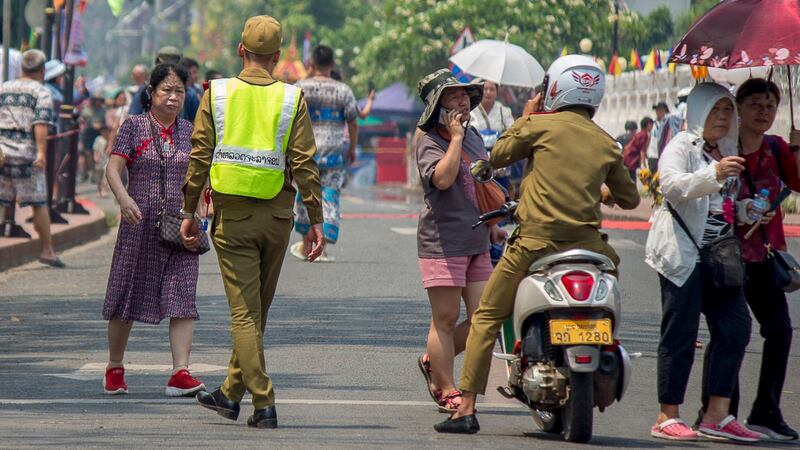Chinese travel companies are illegally hiring Chinese to be tour guides in Laos to meet growing demand for Chinese speakers as visitor numbers surge after the pandemic border closures were lifted in 2022, residents in the country told Radio Free Asia.
While many Lao citizens speak Chinese, most choose to work in other industries, and the Chinese companies actually prefer to hire their own, even if they lack work permits and are not registered with the police, the residents said.
“Yes, we lack Chinese-speaking Lao tour guides these days,” said a Lao guide, who like other sources in this report insisted on not being identified for security reasons. “Some of them found something else to do when COVID hit Laos and they’re not coming back to work as tour guides anymore.”
Laos is a popular destination for Chinese visitors – many from neighboring Kuming province – because the two countries are connected by rail and have good diplomatic relations, sources said.

According to official statistics, nearly 700,000 Chinese visited Laos in 2023, the third-highest number behind Thailand and Vietnam. In the first quarter, that trend continued, with more than 240,000 Chinese visited the landlocked Southeast Asian country.
There is no reliable data on the number of illegal Chinese tour guides, but many are known to work in Luang Prabang province and in the capital Vientiane, both popular tourist spots.
As of May, there are 270 registered Chinese-speaking Lao tour guides nationwide; 140 work in Luang Prabang province and 60 in Vientiane.
Chinese package tours
Chinese tourists, who typically are herded around on buses from site to site, prefer to use Chinese tour companies based in Laos, the guide said. Those companies arrange transportation into and around Laos with other Chinese companies, lodging with hotels run by Chinese owners, and meals with restaurants owned by Chinese.
The tour companies sometimes will hire only one or two Lao guides to hide their many illegal Chinese guides, the sources said.
A third guide said that sometimes the Chinese companies will hire Lao guides who speak languages other than Chinese, but they rarely ever do their jobs as guides and are only there to bail out the illegal Chinese guides.

If police approach a tour group to ask if they have a guide registered with the police, the Lao tour guides will show up with their credentials, while the Chinese guides lay low, another guide, who is registered, told RFA.
Local guides are skeptical that Chinese guides explain Lao history and culture accurately.
“I have seen that when the Chinese tour guides explain something, sometimes the tourists will laugh,” she said. “When the Chinese tour guides lead the tour groups to temples, I am not sure if they explain about the Buddha statues with the correct information or not.”
Despite the growing number of Lao youths interested in learning Chinese, most of them choose to work as interpreters in other sectors rather than to work as tour guides.

And while some Lao youth speak Chinese language, they do not know Lao history and culture well enough, an English-speaking Lao guide told RFA.
To deal with the shortage and encourage those who left the industry during the pandemic to return, the Lao Mass Media, Culture and Tourism Institute recently announced plans to conduct training for national level Lao tour guides from May to July, an official said.
“Now, Chinese tourists are visiting Laos more and more, but we still do not have enough Chinese-speaking Lao tour guides,” the official said. “Thus, we will have tour guide training for those who want to be tour guides as priority to fill this gap.”
Translated by Phouvong. Edited by Eugene Whong and Malcolm Foster.
